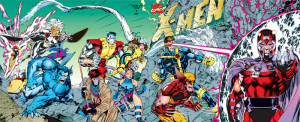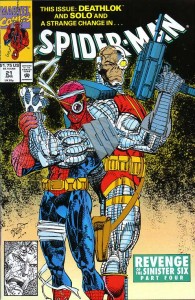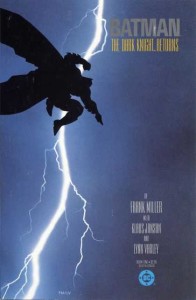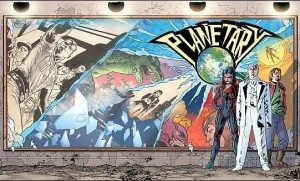Last week on Twitter, Comics creator Jim Zub (who is awesome, btw – go read his SkullKickers or his Japanese contemporary fantasy Wayward) called for creators and comics fans to share #FourComics that influenced them growing up. I shared my four on the hashtag, but thought I’d take some time to unpack these picks and talk a bit about each comic’s influence on me as a young creator.
#FourComics
X-Men #1 (1991 — Chris Claremont, Jim Lee, Scott Williams, Tom Orzechowski, Joe Rosas)
I started reading comics a bit before X-Men #1 came out in 1991, but that issue, with its wide-screen action, large cast, and personal stakes, was a watershed moment for me as a comics reader. It signaled the real beginning of my investment in the X-Men as a franchise, and lead to many years of reading, as well as learning about ensembles and character-driven storytelling.
Spider-Man #21 (1992 – Revenge of the Sinister Six Part Four of Six — Erik Larsen, Joe Rosas, Chris Eliopoulos)
I had already been reading Spider-Man, but this episode, where Spidey is hurt and gets a cybernetic cast-arm and gears up with Deathlok, was my real introduction to 90s comics grimdark before it became fully a parody of itself with overflowing pouches, non-existent muscles, and so on. This one cover and issue stands out in my memory as a signal of ‘this is what comics are like now,’ which I had to embrace or flee from. I ended up reading a lot of the 90s zeitgeist comics because they were what was hot, but this book was probably the one that pointed the way.
Batman: The Dark Knight Returns (1986 — Frank Miller, Klaus Jansen, Lynn Varley, John Costanza)
I was too young for The Dark Knight Returns when it first hit, so when I came to it in probably the late 90s, it had already solidified its role in changing the direction of the character. I’d watched the Adam West show as a kid, then moved on to the Animated Series, which I take as drawing on Dark Knight Returns. But reading the actual comic showed me the depths of emotional intensity and the edge of darkness that vigilante superheroes could show – it gave me a broken-down hero at the edge of his rope coming back to make a difference. Without The Dark Knight Returns, there would be no First Sentinel in Shield and Crocus.
Planetary Vol. 1: All Over The World and Other Stories (1999 — Warren Ellis, John Cassaday, Laura Depuy, Ali Fuchs, Bill O’Neil)
I didn’t start reading Planetary immediately, instead finding it in late 2001 as a college freshman, when I was getting back into comics. But I took to it instantly. I’ve had a love of meta-fiction, especially meta-fiction about genre fiction, since I was very young – probably due to movies like The Princess Bride and The Last Action Hero as well as the Choose Your Own Adventure series, stories and projects that took storytelling as their topic as well as their process.
There’s a story in Planetary which was one of the primary ingredients in the Influence Stew that I cooked up for a new project that will be announced soon, and I look forward to talking about that influence and the creation of the idea. But for now I’ll say that Planetary remains one of my all-time favorite comics, and its approach to story and genre has had a substantial impact on me as a creator,a fan, and a pop culture scholar.
In several alternate universes – where I’m a professor of popular culture/comparative literature – I teach a class called “The Planetary Guide to 20th Century Popular Culture” – using the series as an interpretive frame for examining 20th C. popular culture genres.
I could have easily swapped in several other comics: The Authority, Squadron Supreme, Watchmen, The original Justice League comics hardcover collection I got that let me glimpse way back into the silver age, X-Men 2099, Age of Apocalypse, and more.




